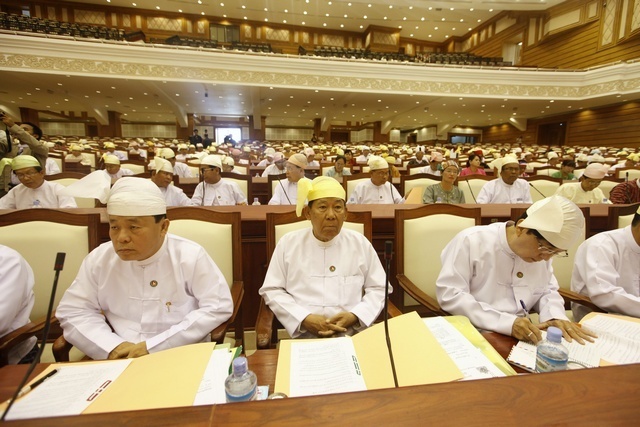Discussion on a recent proposal to switch to a proportional representation (PR) voting system continued this week in the parliament’s upper house, with the majority of parliamentary members being opposed to it.
Submitted last week to the parliament by the National Democratic Front (NDF), the proposal seeks to reform Burma’s electoral system from a first-past-the-post system to a PR system before the general elections scheduled for 2015. Supporters of the PR system say that it would be suited to Burma’s multi-party democracy and would reduce wasted votes, as the first-past-the-post system tends to favour the dominant two parties.
Phone Myint Aung, upper house member, told DVB that discussions on Tuesday were joined by ten parliament members. Six of them, including a representative from the military, were opposed to switching to the PR system.
“One Tatmadaw [Burmese military] representative, four from the National League for Democracy [NLD] and one from the Rakhine [Arakan] National Party were against it, and the rest – all from the Union Solidarity and Development Party [USDP] – voiced their support for it,” Phone Myint Aung said.
Monday’s discussion between eight parliament members also had the two attending USDP members showing their support for the PR system.
According to NLD central committee member Win Myint, the NLD is staunchly against changing the electoral system. He told DVB over the weekend that Burma has no history of the PR system and that the topic is “not currently relevant” in the political arena.
But NDF member Khin Waing Kyi believes that this new system can ensure that every vote – even those for smaller political parties – will count towards ensuring a representative in parliament.
“If the parliament uses the PR system, all the parties can compete and all the voters can have their vote represented,” Khin Waing Kyi said.
The Nationalities Brotherhood Federation, an alliance of 15 ethnic political parties, held a press conference in Naypyidaw on Tuesday, declaring their objection to the proposal. According to NBK spokesman Sai Hla Kyaw, the alliance will stage campaigns in ethnic populated areas to discourage a change.
“We will try to discourage switching to the PR system in ethnic areas and if this doesn’t work, we plan to stage public protests,” said Sai Hla Kyaw, adding that he does not believe a PR system would benefit their smaller ethnic parties.
“Our ethnic parties are not substantial enough to run elections nationwide and we can only focus on our relative regions,” Sai Hla Kyaw said. “Switching to the PR system will allow major parties who can compete all across the country to take seats proportionally, leaving no chance for smaller parties like us to join the parliament.”
Whether or not the PR system would benefit smaller, more regionalised parties – like the ethnic political parties — is up for debate, said Ashley South, an independent political analyst, who nonetheless believes that it is important for ethnic communities to be properly represented.
[related]
“It seems that PR would benefit some ethnic political parties, but is less welcome by others – particularly those seeking to represent geographically concentrated ethnic nationality populations, who may do better with a first-past-the-post system,” South told DVB by email.
He added that military-backed parties – such as the USDP – might be more inclined to back a PR voting system to secure support in the coming election.
“Adopting a PR system in [Burma] might also help military-backed political parties, which could otherwise find themselves with few members of parliament after 2015,” he said. “This could be useful in terms of securing support and buy-in for democratic transition, on the part of the Myanmar Army.”



